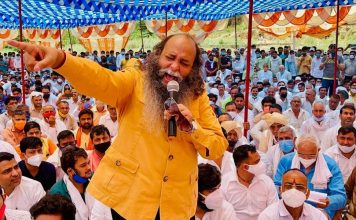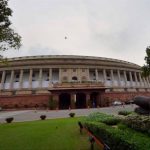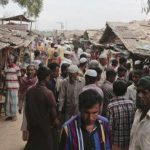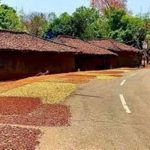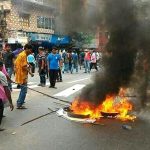A village without Muslims
Debate on Constitution in Lok Sabha: PM Modi Pushes for UCC; Rahul Slams BJP...
Echoes of a budget 40 years ago – that almost died at birth
A flawed definition of secularism lies behind the Ayodhya verdict
More girls studying, but 84% drop out after graduation
Oil pool account can redress petrol price burden
A long-fought battle for justice and peace, for policing police
After the award of the 'Citation of Excellence' for Promotion of Human Rights by the JNU Centre For Human Rights Teaching & Research, presented by Justice P.N. Bhagwati on 10th December 2007, AMU's Vice-Chancellor Prof. P.K. Abdul Azis presented a memento to me in a felicitation program on 26th January 2008. The program was held for the first time in the history of the university to give recognition to those teachers and students who brought laurels to the university in 2007.
Indian-origin Muslim cleric gets honorary doctorate
Why you need to support Dr. Zakir Naik
Winds of change are blowing, but mindsets need a changing
Nothing for appeasement of Muslims in the Union Budget 2014-15
In search of liberals
Buddhist-Muslim Relations in Ladakh – Part 5
With UP in mind, Muslims to float common front to take on ‘communal forces’
Communal harmony must be stressed by Hindu religious leaders as well: Ahmad Shaikh
Modi’s modernity vs saffron orthodoxy
Aamir Edresy: Helping the under-privileged through the Association of Muslim professionals
‘Women intend to quit jobs due to gender bias, harassment’
If government’s attack on NDTV was ‘fascism’, what explains the ban on Kashmir Reader?
Jammu on fire – how to destroy integrity of the country
First there was agitation in Kashmir Valley against the transfer of the land to Sri Amarnath Shrine Board which forced the Government to take back the land allotted to The Board and now for more than a month Jammu is burning demanding the land back for the Sri Amaranth Shrine Board. What has sustained the agitation so long in Jammu? Who provoked it and for what? Is the peace of land a real issue? These are important questions which must be answered satisfactorily.
‘We cannot live in permanent fear’: Dr. J. S. Bandukwala
Madrasa education myth and reality
Food, fuel, water and alternate energy sources
An autopsy of NHRC report on Batla House encounter
Gandhiji and the Prophet (PBUH)
The pointing finger of Babasaheb Ambedkar

The Question of allegiance: Quandary of Aligarh Muslim University
Muslims need to choose their battles
Will Obama go further than Reagan in Reykjavik?
Congress has its nose ahead in coming general election
LS elections: who will have the last laugh in Kerala’s Muslim politics?
The Mainstreaming of Asaduddin Owaisi
Report: South Indian Muslim Convention, Kochi, Kerala
Economy becoming important in deciding electoral fortunes
Fatwas and Muslim Women
Islam: the state or civilisation?
With demonetisation, PM Modi has made common people feel like thieves
The Muslim Ulema and status of women
By Asghar Ali Engineer
The other day I read a news item in the Urdu daily from Mumbai Inquilab about the coming session of Muslim Personal Law Board. I was utterly shocked to read that Personal Law Board is worried that the Government of India has passed a law against domestic violence whereas our ‘Ulema and fuqaha’ (jurists) have always permitted beating of women. According to the law against domestic violence Muslim men have lost right to beat their wives.
The CIA’s secret triumph
Two approaches to justice in Bombay
Ruling party’s patriotic card backfires
Agenda for India: Agriculture

Raza Academy says cleaning an ‘insulting job’, Islamic teachings say otherwise
Jharkhand after 20 years: Rich state, poor people and a tale of betrayal
Rohingyas urge India to create conditions conducive for their return
Community Empowerment: A Rights based approach
When nature cries
Scholarships for minority students
Keeping its promise to share the fruit of development with all section of society, the UPA government at centre on Wednesday generously approved a handsome amount for the educational upliftement of minorities in the country.
Gujarat elections and aftermath
Saudi, Iranian leaders involve India in regional peace
The travails of the Indian diaspora in Malaysia
Seven pastors killed, 20% rise in attacks on Christians in 2015, says minority group
Extremism: The responsibilities of the Ulema and Muslim intellectuals
Price of oil approaching $100 per barrel
Falling oil prices may spur Modi for more reforms
Education not diminishing India’s preference for boys
What can we expect from the upcoming AMU student elections?
How relevant are madrassas today?
To gain Muslim confidence, end media trials
Labourer killed over petty issue in Delhi
Men against violence-2: Socio-economic inequality leads to violence
Interaction with a warrior in the battlefield of Muslim reservation
Maulana Syed Fazlul Hasan Hasrat Mohani
Gujjar agitation: Dark side of affirmative action
With no end to feud, Mulayam-Akhilesh look for life beyond the ‘cycle’
Who will occupy the palace on Raisina Hill?
Since A.P.J. Abdul Kalam is an accidental president, it is not surprising that he doesn't have the support of any major political party for another term.
Islam and Jihad in context of international treaties and citizenship of a Non-Muslim majority...
MPs’ salary hike: Do they have a case?
Tinderbox situation in North Africa: Can have dangerous spillover effects
Why the Indian establishment fears Kejriwal?
Bihar and Lok Sabha Election 2014
Rajya Sabha: Dy Chairman K Rahman Khan spoke loudly on Muslim issues
India’s corruption and competitiveness
Baking baguettes in India: Taking bread beyond borders
Torture is one of the most common forms of human rights violations
UP elections: Elephant moves slower as Cycle picks up pace
Modi must re-engage, shape historic changes in West Asia
The fidayeens are back, but we aren’t ready
Yoga Day: Muslims join in, say they feel rejuvenated
Muslim women of Malabar
A model students union for AMU
Muslims in introspection mode… now a fatwa on Dr. Zakir Naik
Civility against Caste: Dalit Politics and Citizenship in Western India
 Title: Civility against Caste: Dalit Politics and Citizenship in Western India
Author: Prof. Suryakant Waghmore
Publisher: Sage India
Year: January, 2014
Review by: Yogesh Maitreya for TwoCircles.net,
Civility is the least discussed discourse in India. In post-constitutional Indian society, the idea of civility has formed a binary: on one hand, ‘civil society’ that has been propagated by media and resources which are dominated and owned by Brahmin-Bania associations and on the other hand, the civility which has been practice by NGOs and political organisations led by Dalits. The latter had started with the core motive of annihilation of caste and, found its genesis in the struggles of Mahatma Fule and Dr. B.R.Ambedkar in Maharashtra. The idea of civility, practiced by Dalit NGOs and political groups, is contrary to the idea of civility which Brahmin-Bania possess and propagate in India, simply because idea of civility practiced by Dalits aims at annihilation of caste; precisely, Dalit civility is the ‘Civility against Caste’.
Title: Civility against Caste: Dalit Politics and Citizenship in Western India
Author: Prof. Suryakant Waghmore
Publisher: Sage India
Year: January, 2014
Review by: Yogesh Maitreya for TwoCircles.net,
Civility is the least discussed discourse in India. In post-constitutional Indian society, the idea of civility has formed a binary: on one hand, ‘civil society’ that has been propagated by media and resources which are dominated and owned by Brahmin-Bania associations and on the other hand, the civility which has been practice by NGOs and political organisations led by Dalits. The latter had started with the core motive of annihilation of caste and, found its genesis in the struggles of Mahatma Fule and Dr. B.R.Ambedkar in Maharashtra. The idea of civility, practiced by Dalit NGOs and political groups, is contrary to the idea of civility which Brahmin-Bania possess and propagate in India, simply because idea of civility practiced by Dalits aims at annihilation of caste; precisely, Dalit civility is the ‘Civility against Caste’. Asma Nama: P for Preaching; P for Practice?
Fatwa changed history of ‘The Satanic Verses’, says Ben Okri
Abul Hussain – A different story of a differently able person
Pakistan tests nuclear-capable cruise missile
The killer Dengue and the sordid saga of poor governance
Cheraman Mosque to get heritage museum, digital library
Break the silence: Ending gender-based violence is a human rights imperative
Fight for justice in India and USA: Similarities and faultlines
Justice denied, now waiting for judgment: Sheikh Hashim Ali’s 13 years’ incarceration
Husain should return to his ‘culturally exuberant’ India
Tension in Telangana village after mob attack
Role of Akram Hussain Saikia in the freedom struggle of India
Beyond the Mekong: Indian Muslims in Laos
Bandh was a political and tactical mistake
The BJP turns to GenPast: but will Advani deliver?
That the Bharatiya Janata Party (BJP) would make the perennial No. 2 of GenPast its new No. 1 should cause no surprise. After all, for as long as one can remember, Atal Bihari Vajpayee and L.K. Advani were the 'twin towers' (as a hawkish scribe derisively described them) of first the Jan Sangh and then the BJP. So, if one withdraws from the fray, the other has to step in almost automatically.


